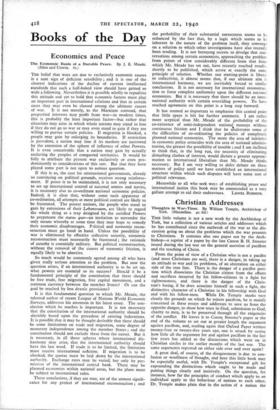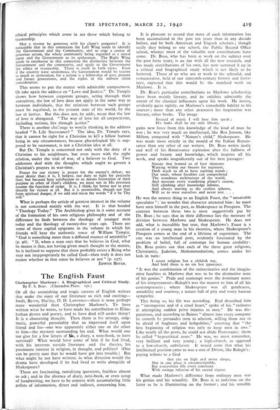Christian Addresses
Thoughts in War-Time. By William Temple, Archbishop of York. (Macmillan. 4s. 6d.)
THIS little volume is not a new work by the Archbishop of York, but a colleCtion of various articles and addresses which he has contributed since the outbreak of the war to the dis- cussion going on about the problems which the war presents to Christians. It contains also one paper not by the Arch- bishop—a reprint of a paper by the late Canon B. H. Streeter issued during the last war on the general question of pacifism and the teaching of Christ.
From the point of view of a Christian who is not a pacifist (and most Christians are not), there is a danger, in taking up an attitude to war and its problems, of an aberration on either side of the true line. There is the danger of a pacifist posi- tion which dissociates the Christian citizen from the efforts and sacrifices incurred by his fellow-citizens in a fight for righteousness, and there is the danger of the Chris- tian's losing, if he does associate himself in such a fight, the distinctive character of a Christian in his fellowship with God and with his fellow-men. While Dr. Temple marks very clearly the grounds on which he rejects pacifism, he is mainly concerned in these essays and addresses to save us from the opposite danger, to show how trust in God, submission to God, charity to men, is to be preserved through all the exigencies of the conflict. He leaves it to Canon Streeter's paper at the end of the volume to set out at greater length the argument against pacifism, and, reading again that Oxford Paper written twenty-four or twenty-five years ago, one is struck by seeing how little all the argument for and against pacifism in the last few years has added to the discussions which went on in Christian circles in the earlier months of the last war. The same arguments repeated on either side over and over again!
A great deal, of course, of the disagreement is due to con- fusion or woolliness of thought, and here this little book may be especially useful, with Dr. Temple's exceptional gift for expounding the distinctions which ought to be made and putting things clearly and incisively. On the question, for instance, how far the principles of conduct which apply to an individual apply to the behaviour of nations to each other, Dr. Temple makes plain that in the action of a nation the
ethical principles which come in are those which belong to trusteeship.
May a trustee be generous with his client's property? It is noticeable that in this connexion the Left Wing tends to identify the Government and the Community, and so urge a course of generous action, the whole community being regarded as a moral agent and the Government as its spokesman. The Right Wing tends to emphasise in this connexion the distinction between the Government and the community, and apply to the Government the ethics of trusteeship. There is truth in both views. Even if the country were unanimous, the Governnient would be trustee as much as spokesman, for a nation is a fellowship of past, present and future generations, and the rights of the unborn claim consideration.
This seems to put the matter with admirable compactness. Or take again the address on " Love and Justice." Dr. Temple shows how between corporate groups, acting through their executives, the law of love does not apply in the same way as between individuals, that the relations between such groups must be regulated, in the present state of the world, by the law of justice. But this does not, he adds, mean that the law of love is abrogated. " The way of love for all corporations, including nations, lies through justice."
There is another challenge to woolly thinking in the address headed " Is Life Sacrosanct? " The idea, Dr. Temple says, that it cannot be right for a Christian to kill a fellow human being in any circumstances, because physiological life is sup- posed to be sacrosanct, is not a Christian idea at all.
But Dr. Temple is concerned not only with the duty of a Christian to his neighbours, but even more with the right relation, under the trial of war, of a believer to God. Two addresses deal with the thoughts which ought to govern a Christian's prayers in war-time.
Prayer for our victory is prayer for the enemy's defeat; we must desire that; it is, I believe, our duty to fight for precisely that; but because here satisfaction to us means frustration of their purpose to other of God's children, we must not in His presence assume the function of judge. It is, I think, far better not to pray directly for victory at all. But it is permissible, though not free from spiritual danger, if we add and mean the words " if it be Thy will."
What is perhaps the article of greatest interest in the volume is not concerned mainly with the war. It is that headed " Theology Today." The Archbishop gives in it some account of the formation of his own religious philosophy and of the difference he finds between the theology of younger men today and the theology of twenty-five years ago. There are some of those capital epigrams in the volume in which his friends will hear the authentic voice of William Temple. " God is something more than a diffused essence of amiability " (p. 96). " If, when a man says that he believes in God, what he means is that, not having given much thought to the matter, he is inclined to suppose that there probably exists a Being who may not inappropriately be called God—then truly it does not matter whether in that sense he believes or not" (p. 127).
EDWYN BEVAN.







































 Previous page
Previous page